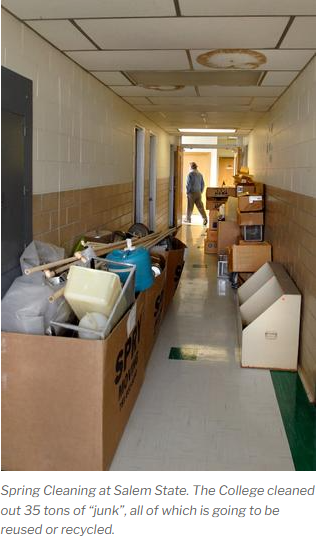By Leslie Griffin
Mar 16, 2007
SALEM – Spring is coming, and it is not just the grass that is turning green. Salem State College is in the process of turning the entire campus green and environmentally friendly.
While students are on spring break, the campus is conducting phase two of a recycling effort that began in January. Phase one consisted of the removal of 21.73 tons of paper, 2.22 tons of electronics and about 11 tons of mixed debris.
“The effort just snowballed,” said sustainability manager Tom Osborne. He credits President Nancy Harrington for wanting to spruce up the college before retiring in June. The college actually gains two classrooms through the massive spring-cleaning effort.

Working with the Institution Recycling Network (IRN), Salem State recycled small items from the Mainstage Theater, Sullivan Building and administration building. Phase two consists of the rest of the buildings on campus recycling their paper, electronics and debris. A representative from the IRN has been on hand to help instruct proper recycling techniques. Phase three, which will take place in April during the public school vacation, will consist of the removal of larger objects and furniture that are still useable from the on-campus Horace Mann Elementary School.
IRN will take anything that may be still useable and donate products nationally and overseas. “What might look like junk to us, they can patch up with a few screws, and off it goes to be reused,” said Osborne.
Department heads in Salem State College worked with Spry Moving Company to help rid the buildings of unused furniture. “It has been a very positive action by the college, and actually brought a lot of people together who don’t usually work together, so you know each other’s names,” said Osborne.
Ashley Carroll, a Salem State student and member of MASSPIRG (Massachusetts Public Interest Research Group), has been able to acquire $4,500 in grants from Salem State to set up a recycling program at the dormitory at Central Campus. She hopes to use student volunteers to make the effort succeed.
Green Efforts
The recycling effort is only one part of the Salem State’s effort to go green. “We are really looking hard at greenhouse gas emissions and carbon emissions and trying to reduce those, [and] avert global warming,” said Osborne. “We may not make a big difference, but we are part of the solution.”
In January, the college paid a small premium to purchase renewable energy credits, which is “green” electricity. SSC signed a three-year contract to purchase 3,500 megawatts per year. “Because we purchased, that means that more wind turbines and solar panels will be made,” said Osborne. The money Salem State invested creates a larger market for renewable energy.
College officials said building one on Central Campus, which is the former GTE/Sylvania site, uses only green electricity. The 450-bed residence village that was constructed in 2004, and is registered as an LEED (leadership in energy and environmental design) building, uses 49 percent green electricity.
Osborne is a promoter of wind energy, but some wind farms are not succeeding in this country, often due to public opposition. “People can see them from so far away that so many people can complain,” said Osborne. Salem State has also begun burning 3 percent bio-diesel fuel in the Harrington building. This is cleaner fuel that cuts down emissions. Although there is a slight premium for this fuel, the money is recovered through a state sustainability grant.
Throughout campus, Salem State has installed dual burning boilers, which are able to burn clean gas. The college also just received approval for funding for a solar ray. It will be a $600,000-plus ray to help power the SSC dormitories. A third of the funding is coming from Clean Renewable Energy from the IRS, and the remained will come from a grant from the Massachusetts Technical Collaborative Funds.
“Students will get used to being around renewable energy,” said Osborne. “It is part of their education as well.” Salem State has also made an effort to clean out the marshes and channels around campus, and to retrofit light fixtures with energy-efficient models. Osborne emphasized the need to use renewable energy over foreign oil: “All they need to do is shut us down again, and our economy collapses.”

